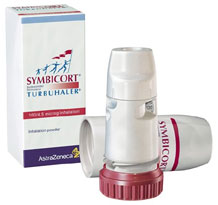Do pregnant women with allergies get small drops?
Pregnant women with allergic rhinitis are often advised to use only saline solution. However, in case of extreme discomfort, they can still take anti-allergy medications according to the doctor's instructions.

Budesonid nasal spray - Symbicort® (Photo: astmainfo)
Acute allergic rhinitis appears with symptoms of runny nose, sneezing, and stuffy nose. These signs are usually worse in the early morning or when exposed to stimulating factors such as aroma, cold air, smoke, dust. If left untreated, allergic rhinitis can significantly affect the patient's life.
The use of 0.9% saline for regular nasal washing can reduce symptoms of allergic rhinitis in some cases, but it cannot completely eliminate symptoms. There are many types of allergic rhinitis medications that can be used by pregnant women without harming the baby.
At therapeutic doses, some antihistamines such as chlorpheniramine, diphehydramine, loratadine and cetirizine have been confirmed for safety in pregnancy. They can significantly reduce symptoms of nasal itching, runny nose and sneezing.
Glucocorticoid nasal sprays such as budesonid, beclomethason, fluticason are effective in controlling allergic rhinitis and do not cause any harm to the fetus. The drug only maximizes its effect after 3-5 days.
If the nasal congestion persists, the woman may have a nasal discharge with 1% ephedrine solution to help relieve this symptom. Avoid using nasal congestion medications containing pseudoephedrine, which can cause birth defects.
Even with drugs that are considered safe, if you want to use them, you still need to be prescribed by your doctor and give specific instructions about the dose and duration for each treatment.
Doctor Pham Truong
- Should pregnant women get lost?
- Malaysian pregnant women first infected with Zika virus
- How pregnant pregnant women need Zika to handle
- Explain the science behind the pregnant woman's curious appetite
- How to deal with facial allergies
- The truth is less known about allergies
- Pregnant women with Rubella infection are at risk of conception
- Pregnant women today are more susceptible to depression and anxiety than the older generation
- How to cure hemorrhoids for pregnant women
- Why do rural women often give birth to larger children?
- Discovered 3,700 year old remains of women about to give birth in Egypt
- Which age women are easily pregnant?
 Green tea cleans teeth better than mouthwash?
Green tea cleans teeth better than mouthwash? Death kiss: This is why you should not let anyone kiss your baby's lips
Death kiss: This is why you should not let anyone kiss your baby's lips What is salmonellosis?
What is salmonellosis? Caution should be exercised when using aloe vera through eating and drinking
Caution should be exercised when using aloe vera through eating and drinking